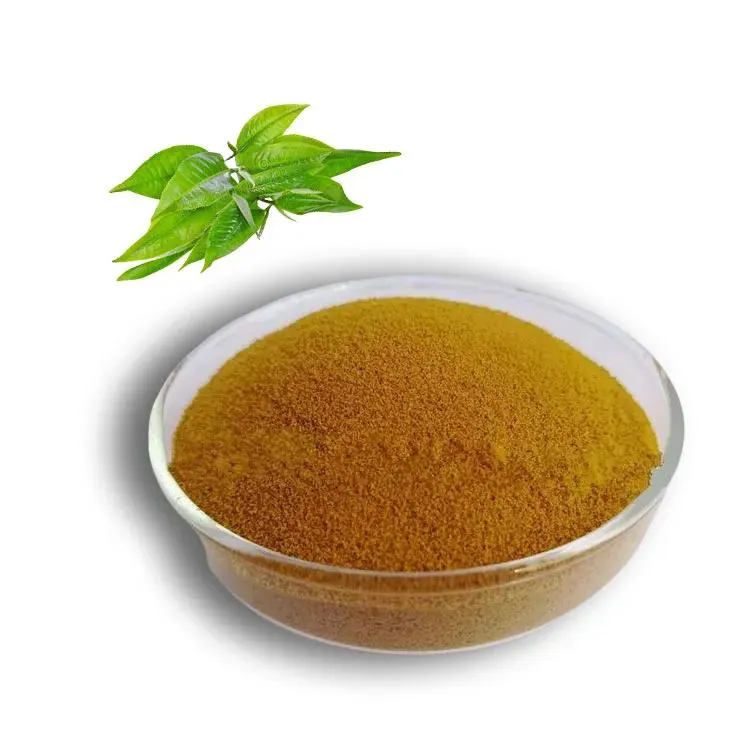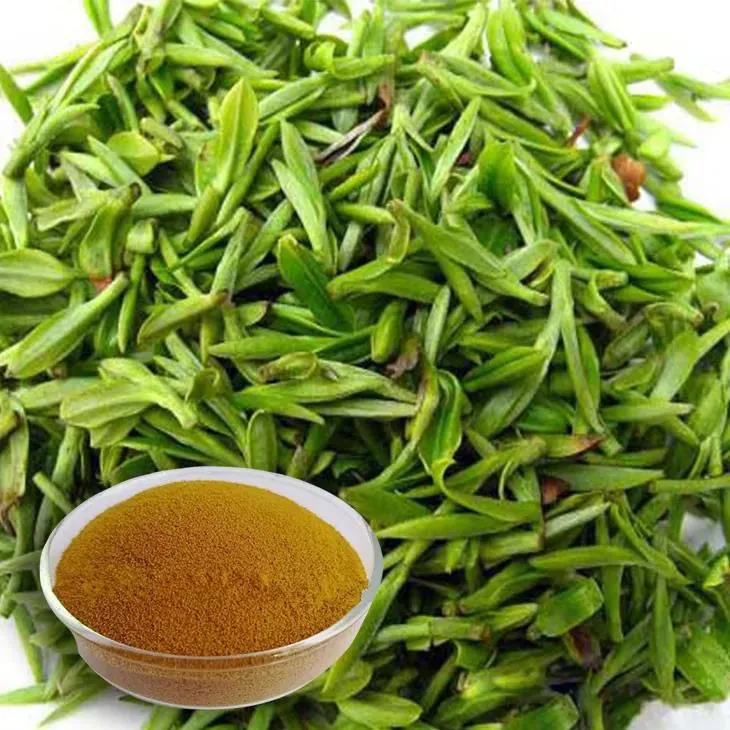- 0086-571-85302990
- sales@greenskybio.com
Is Green Tea Extract Anti-Inflammatory?
2025-03-18

Green Tea Extract has become increasingly popular in the health and wellness industry due to its wide array of potential health benefits. Derived from the leaves of the Camellia sinensis plant, Green Tea Extract is highly concentrated and contains powerful bioactive compounds, including catechins, antioxidants, and polyphenols. Among its many benefits, Green Tea Extract is frequently hailed for its anti-inflammatory properties, which can positively impact various aspects of health, from reducing chronic inflammation to alleviating symptoms of inflammatory disorders. In this article, we will explore whether green tea extract is indeed anti-inflammatory, look at the scientific evidence supporting this claim, and examine how it works to combat inflammation.
Understanding Green Tea Extract and Its Key Components
Green tea extract is obtained by isolating concentrated compounds from green tea leaves. These compounds are rich in antioxidants and include catechins, flavonoids, and polyphenols, which are responsible for the majority of green tea’s health-promoting effects. One catechin in particular—epigallocatechin gallate (EGCG)—is the most abundant and active compound associated with green tea’s anti-inflammatory capabilities.
EGCG, alongside other polyphenols, combats oxidative stress and modulates inflammatory pathways in the body. Because chronic inflammation is a key contributor to the progression of numerous health conditions, including cardiovascular disease, arthritis, diabetes, and neurodegenerative disorders, green tea extract offers promising therapeutic potential in natural medicine.

How Does Green Tea Extract Combat Inflammation?
To understand how green tea extract exhibits anti-inflammatory effects, we need to examine the biological mechanisms behind inflammation and the impact of green tea’s bioactive components on inflammatory processes.
1. Modulation of Cytokines
Cytokines are signaling molecules that play a significant role in inflammation. Pro-inflammatory cytokines like interleukin-6 (IL-6), tumor necrosis factor-alpha (TNF-α), and interleukin-1 beta (IL-1β) are involved in propagating the inflammatory response during injury, infection, or autoimmune disorders. Chronic overexpression of these cytokines can lead to sustained inflammation and tissue damage.
Green tea extract has been shown to inhibit the production of these pro-inflammatory cytokines. Research indicates that EGCG and other antioxidants in green tea suppress the activation of nuclear factor-kappa B (NF-κB), a protein complex that regulates cytokine production. By blocking NF-κB, green tea extract reduces inflammation and helps maintain normal inflammatory responses.
2. Combating Oxidative Stress
Inflammation is closely linked to oxidative stress, which occurs when there is an imbalance between free radical production and the body’s ability to neutralize them using antioxidants. Excessive oxidative stress leads to cellular damage and triggers inflammatory pathways.
Green tea extract is rich in antioxidants that combat free radicals and restore balance in the body. EGCG directly neutralizes harmful reactive oxygen species (ROS) and reduces oxidative damage, which in turn helps minimize inflammation. This dual role of reducing oxidative stress and inflammation makes green tea extract particularly beneficial for chronic conditions.
3. Suppression of COX-2 Enzyme Activity
The cyclooxygenase-2 (COX-2) enzyme is responsible for producing prostaglandins, which promote inflammation, pain, and fever during injury or disease. Overexpression of COX-2 is linked to conditions such as arthritis, inflammatory bowel disease (IBD), and certain cancers.
Research suggests that green tea extract can suppress COX-2 activity, thereby reducing the production of pro-inflammatory molecules. This mechanism is similar to the action of non-steroidal anti-inflammatory drugs (NSAIDs), but green tea extract provides a natural and gentler alternative for managing inflammation.
4. Regulating Immune Responses
Green tea extract also modulates the activity of immune cells involved in inflammation, such as macrophages and dendritic cells. EGCG has been found to inhibit excessive activation of these cells, thereby preventing the overproduction of inflammatory mediators and immune responses associated with autoimmune disorders or chronic inflammation.

Evidence Supporting Green Tea Extract’s Anti-Inflammatory Properties
Numerous studies have supported the anti-inflammatory effects of green tea extract in a variety of contexts:
Arthritis and Joint Health
Green tea extract has demonstrated promising results in managing inflammation associated with arthritis. Studies have shown that EGCG decreases the production of inflammatory markers and reduces cartilage damage in animal models of rheumatoid arthritis and osteoarthritis.
Cardiovascular Health
Chronic inflammation and oxidative stress are major contributors to cardiovascular disease. Green tea extract’s ability to inhibit inflammatory molecules and reduce oxidative stress has been shown to improve endothelial function, lower blood pressure, and support overall heart health.
Neurodegenerative Disorders
Neuroinflammation is a key factor in the progression of neurodegenerative diseases like Alzheimer’s and Parkinson’s. Green tea extract’s anti-inflammatory properties help protect neurons from damage, reduce brain inflammation, and improve cognitive function.
Inflammatory Bowel Disease (IBD)
Research indicates that green tea extract may benefit individuals with IBD, such as Crohn’s disease and ulcerative colitis, by reducing intestinal inflammation and improving gut health. EGCG has been shown to modulate inflammatory pathways in the gastrointestinal tract and promote healing of inflamed tissues.
Skin Health
Inflammation plays a significant role in skin conditions like acne, eczema, and psoriasis. Green tea extract is commonly included in topical formulations and skincare products for its ability to soothe inflammation, reduce redness, and promote skin healing.

How to Integrate Green Tea Extract Into Your Routine
Green tea extract is available in various forms, including capsules, powders, and liquid extracts, making it convenient to incorporate into your daily routine. The extract is often standardized to contain specific amounts of EGCG for maximum effectiveness.
Dietary Supplements: Green tea extract capsules or tablets are a popular option for those seeking concentrated doses of anti-inflammatory catechins.
Powdered Extracts: These can be added to smoothies, teas, and other beverages for easy consumption.
Skin Products: Creams or lotions with green tea extract are beneficial for localized inflammation and skin health.
It’s important to follow the recommended dosage guidelines provided by the product and consult with a healthcare provider if you are pregnant, breastfeeding, or taking medications, as green tea extract may interact with certain drugs.
Potential Limitations
Though green tea extract is generally considered safe, it is important to avoid exceeding recommended doses, as high concentrations of EGCG may lead to side effects such as liver toxicity in rare cases. Individuals sensitive to caffeine should also be mindful that green tea extract may contain trace amounts of caffeine.
Conclusion
Green tea extract is a remarkable natural remedy with proven anti-inflammatory properties. Its ability to modulate inflammatory pathways, combat oxidative stress, and suppress the activity of inflammatory molecules makes it a valuable tool for addressing both acute and chronic inflammation. Backed by scientific evidence, green tea extract offers benefits for conditions ranging from arthritis and cardiovascular disease to neurodegenerative disorders and skin health.
Incorporating green tea extract into your wellness routine can be an effective and natural way to support overall health and manage inflammation. However, as with any supplement, care should be taken to use it responsibly and consult with a healthcare professional if needed. Thanks to its potent bioactive compounds like EGCG, green tea extract remains a cornerstone of anti-inflammatory nutrition and natural medicine.
- ▶ Hesperidin
- ▶ citrus bioflavonoids
- ▶ plant extract
- ▶ lycopene
- ▶ Diosmin
- ▶ Grape seed extract
- ▶ Sea buckthorn Juice Powder
- ▶ Beetroot powder
- ▶ Hops Extract
- ▶ Artichoke Extract
- ▶ Reishi mushroom extract
- ▶ Astaxanthin
- ▶ Green Tea Extract
- ▶ Curcumin Extract
- ▶ Horse Chestnut Extract
- ▶ Other Problems
- ▶ Boswellia Serrata Extract
- ▶ Resveratrol Extract
- ▶ Marigold Extract
- ▶ Grape Leaf Extract
- ▶ blog3
- ▶ blog4
- ▶ blog5
-
Is Green Tea Good for Your Kidneys?
2025-03-18
-
Who Shouldn’t Take Green Tea Extract?
2025-03-18
-
What Is the Best Green Tea Extract?
2025-03-18
-
What Is Green Tea Extract For?
2025-03-18
-
White mustard seed extract
2025-03-18
-
Europen Bilberry Extract
2025-03-18
-
Troxerutin
2025-03-18
-
Medicinal Marshmallow Extract
2025-03-18
-
Nettle leaf extract
2025-03-18
-
Black Garlic Extract
2025-03-18
-
Chasteberry Extract
2025-03-18
-
Grapefruit Seed Extract Powder
2025-03-18
-
Plantain extract
2025-03-18
-
Oat Straw Extract Powder
2025-03-18






























